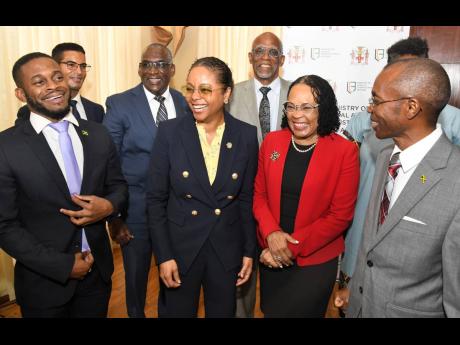Peter Espeut | One year later but no progress
We use words like “public consultation” and “public education” but maybe we don’t all agree on what they mean. The same is true of words like “represent” and “democracy”. In about a year from now when the Jamaica Labour Party (JLP) does its post-mortem on why it lost the general election, I hope they will admit that they lost a lot of public confidence and public support because of how Marlene Malahoo Forte, the minister of legal and constitutional affairs, has mishandled the process of constitutional reform and Jamaica’s transition to a Republic.
Minister Malahoo Forte presides over the small Constitutional Reform Committee (CRC) appointed to drive Jamaica’s constitutional reform process. When the committee was first named, a certain person was said to be “representing” the church, but “the church” knew nothing about it! She chose her pastor to “represent the church”. No reflection on the quality of the good Reverend, but is that real representation? Who was that person really representing? You “represent” those who choose you!
The JLP government also chose persons who would “represent” civil society and youth. Who did they really represent?
After protests, “the church” was allowed to name its genuine representative. The other “representatives” remain on the committee to this day!
This was not a good start, especially of a process to deepen democracy!
In late April 2023 Minister Malahoo Forte announced that the constitutional reform process would take place in three phases; the first phase, expected to run for two months, was to include the repatriation of the Jamaican Constitution, the abolition of the constitutional monarchy, and the establishment of the Republic of Jamaica.
The minister announced that the bill to amend the Constitution would be submitted to Parliament before the end of May 2023! In one month’s time! Another case of rushing through constitutional amendments?
ALL IN SECRET
At that point, six meetings of the CRC had been held, all in secret. The CRC had not invited the public to appear before it to submit their ideas and suggestions as to what Jamaica’s democracy should look like, or what kind of republic we want. And no public education campaign on the issues had been launched. And yet the bill to amend the Constitution would soon be tabled! Obviously, what the Jamaican public wanted was not important!
Minister Malahoo Forte claimed that there was “consensus” on almost everything, except how Jamaica’s president was to be chosen. Consensus by whom? Our politicians? This is not 1962. Jamaicans are not going to accept that our two political parties achieving “consensus” among themselves is national consensus. They need to be reminded that in our last general election in 2020 only 38 per cent of those registered to vote selected one or other of the two tribes. The Jamaican people are not with them!
There is general agreement that the preparation process for the Constitution we have now was flawed. The referendum of 19 September 1961 determined that a (small) majority of Jamaicans (38,942 out of 479,220 who voted) preferred Independence to Federation; but there was no public discussion about what Jamaica’s Independence Constitution should look like.
Alexander Bustamante and Norman Manley – each with their retinue in tow – travelled to England to meet with our British colonial masters, and together they negotiated, resulting in our 1962 Independence Constitution. There were no public meetings or consultations in Jamaica, no hearings of suggestions from civil society, no tapping of public opinion on what the supreme law of the land should contain. Only the views of our two major political parties – and the interests they represented, including those of their financial backers – were taken into account.
Has our democracy deepened over the last 60 years? It seems not!
BACKED OFF
A year ago, in the face of widespread public protest, and calls for public education on constitutional options, and public consultation on what we wanted, Minister Malahoo Forte backed off, and did not table the Constitutional Amendment Bill in May 2023.
Last Monday (April 2) Minister Malahoo Forte announced that, for Phase 1, “The Constitutional Reform Committee has now signed off on the list of recommendations. The document is being prepared for signature of committee members.” What advances in achieving public consensus on our new Constitution have been made over the last 12 months?
Do the CRC, Minister Malahoo Forte, and the Cabinet of Jamaica believe that the three “town halls” they held (meaning gatherings where the CRC announced what it intends to do and asks for comment from the small number of those present) constitutes “public consultation”?
Do the CRC and the Government of Jamaica believe that the 30-second PR jingles they placed in the public media constitute “public education”?
Changing matters to do with the monarchy in our present constitution requires a national referendum, in which the proposition must be supported by upwards of sixty percent of those voting. This will not happen in our political environment without the support of the Opposition. If the public feels rushed, or is dissatisfied with the process, the “nays” and the protest vote could well defeat the effort.
This present JLP government has lost several court cases on constitutional matters, and has also been defeated in the court of public opinion. The approach it is taking to constitutional reform is risky because it lacks transparency. How does the government expect to get widespread public buy-in in a referendum without widespread public awareness of what is being discussed, and what is at stake?
The Andrew Holness administration has earned its reputation for a high-handed approach to governance and its resistance to genuine consultation with the Jamaican people. Jamaicans will not vote “yea” in a referendum restricted to removing the monarchy where other matters (like term limits and a fixed election date) remain unresolved.
Peter Espeut is a sociologist and a development scientist. Send feedback to columns@gleanerjm.com

